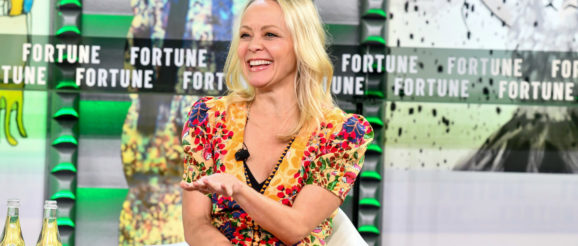Why Innovation Is Finally Coming for Feminine Care Products

Maria Molland, CEO of Thinx, the maker of period underwear, knows her product makes people uncomfortable. Challenging—or stoking—that discomfort, she admits, is key to the 5-year-old company’s strategy.
That’s exactly what the company, which took in $50 million
in revenue last year, was going for when it ran its first nationwide television
ad earlier this year. The TV spot, which imagined a world in which men got
periods, was rejected by some networks unless the company cut a scene showing a
tampon string hanging out of a man’s underwear.
“Our whole point is not shock and awe,” said Molland, speaking at Fortune’s Most Powerful Women Next Gen conference in Laguna Niguel, Calif., on Wednesday afternoon. “The point is to get people to talk, and to get them to talk, you have to make them think, and making them think is sometimes being out in front of them with something that is very thought-provoking.”
She added, “How do we get more people to know: one, it’s
ridiculous we can’t talk about these things?; And two—this was pretty slight in
the ad—period underwear exists.”
That sort of openness has been absent in the century-old, $1.6 billion feminine products industry, which Molland characterized as a long-held duopoly of Kimberly-Clark and Procter & Gamble. Given that market stasis and its taboo nature, Thinx initially struggled to attract venture capital funding, said Molland. “It’s hard to change behavior in a market where there is a lot cultural stigma, and so it forced us early on to be profitable as possible.”
There’s evidence that focus and the company’s forthright marketing approach—not to mention a bevy of other feminine care start-ups—has begun to shake things up. “We’ve proven that there are people out there that want a new solution. It’s ridiculous there has been lack of innovation in almost 100 years,” said Molland.
In September, the company raised money from one of the industry’s big players, Kimberly-Clark. “They obviously saw this is becoming a market that’s very interesting,” said Molland.
—Chanel Miller is more than “Emily Doe”
—The “blameless post mortem” and other techniques that spur innovation
—Career pivots are daunting. Here’s how three powerful women made them work
—Goldman Sachs removed one word from recruiting materials and female hires soared
—Exclusive: Enterprise scion Chrissy Taylor to become car rental giant’s CEO
Keep up with the world’s most powerful women with The Broadsheet newsletter.
